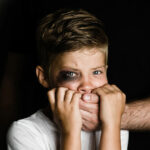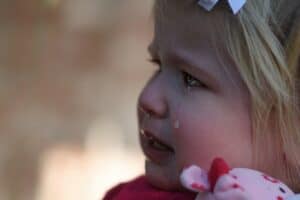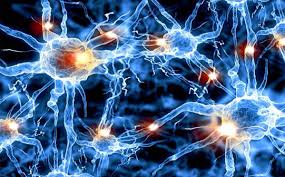Most of us have a sense that childhood trauma affects our adult relationships. After all, you probably have heard another person joke about how you married your father (or mother)? An insurance company even riffed on this in their advertising!
Jokes aside, how exactly does childhood trauma affect your adult relationships? And while we’re at it, what makes something traumatic anyway?
There are 3 common ways childhood trauma can affect your adult relationships. To understand why, you first must look at how childhood trauma affects development. Then you can see how your childhood is supposed to lay a solid foundation for your adult relationships.
How Your Childhood is Supposed to Work
Stability
In the grand Utopian design of life, you are supposed to be born into loving home. Your parents love and support each other, and are excited to welcome you into the family. They are stable financially, socially, physically, emotionally, mentally, etc. Your folks even have support from family and friends in each of those areas to buffer life stress.
Out of that stability your parents create time for you. They make sure one of them stays home with you at least through the time you start school. Your parents give you more positive than negative attention. They set and maintain consistent limits with you. They see your strengths and help you develop them. Similarly, they help you recognize and work on your weaknesses. Your parents introduce you to the world and show you how it works.
The Growth of Emotional Regulation
Out of that secure, stable, loving environment you get to do the important work of growing up. (It takes the form of play when you’re young). Unexpected and trying things happen to you. But they don’t become trauma because there is enough support to help you manage the stress of those challenges.

What does adequate support look like? Hungry? They feed you. Need a diaper change? Got it. Want soothing because the clown was scary? They hold you and provide reassurance. Your parents support the growth of your nervous system by acting as your emotional and physiological regulator. As you grow, you gradually internalize those skills. You increasingly regulate your own emotions and physiology.
Identity and Relationships
All of this helps shape your identity. Especially in your teen years, your unique identity further solidifies. Out of that sense of identity and your base of self-regulation, you become able to navigate relationships. From peers to friends to co-workers to intimate others, you learn how to do “relationship.” You learn how to be yourself and share yourself with other people. And you learn how to support them in being themselves.
You’re able to do this mostly because you’ve experienced the rhythm of a secure intimate relationship with your parents. And you’ve observed how your parents relate with each other, and how they relate to friends and family.
And this is how it all works. In Utopia.
How Trauma Messes Up Your Childhood and Relationships
But you don’t live in Utopia. You live in the real world. And the real world unfortunately includes trauma. When trauma happens in childhood, it has especially toxic effects for adult relationships.
So What is Trauma?
There are a lot of ways to define trauma, but I particularly like these definitions:
• Anything that overwhelms the body’s ability to cope. That is, it’s too much (or happens too soon or too fast) for you to integrate it physiologically or emotionally.
• Anything perceived by the mind or body as life-threatening leaving you helpless to protect or defend yourself.
Now consider childhood trauma. What comes to your mind? I’m betting things like this:

• Physical or sexual abuse
• Unrelenting bullying
• Domestic violence
• Significant surgery or intense illness
• A natural disaster
• A human-made disaster, like war
Yes, those are clearly traumas. But trauma in childhood can take other forms. A type of childhood trauma that can particularly affect adult relationships is developmental trauma. Generally defined, this is trauma occurring in the earliest years, from in-utero through age 3. Sometimes this category of trauma includes up to ages 5, 8, or 12 depending on the researcher. Developmental trauma is not as obvious as the list above, as you will see below.
Developmental Trauma is like Jenga™
Early childhood is a time of rapid brain and nervous system development. This development happens sequentially. Levels get laid on top of each other. So stressors in early childhood that overwhelm the system’s ability to cope result in trauma with far-reaching consequences – even into adulthood and with relationships. Think of it like the tower of blocks in the game Jenga™.
The first Jenga™ blocks to be laid down form the base of the brain, also called the brainstem. The brainstem handles body functions related to survival, like breathing. This brain foundation also includes your spinal cord and basic nervous system framework.
The Next Layer
The next blocks laid down form the midbrain. This section intimately integrates with the brainstem. The midbrain controls emotional and memory function. Along with the nervous system, the midbrain is hugely involved in stress response. It also drives attachment styles that affect adult relationships (more about that below).
The Final Layer
The last Jenga™ blocks placed on top form the cerebral cortex. This part of the brain deals with many things, but especially executive functioning. This includes all your cognitive abilities, like meaning-making, assessment, planning, etc.
So just like the Jenga™ tower, the brain and nervous system develop from the bottom up. But when stress responses activate early – or worse, chronically – it disturbs brain development. It’s as if the Jenga™ blocks get laid down askew – or sometimes not at all. The tower becomes unstable and susceptible to malfunction or faulty adaptation as stressors challenge it. This can show up as a variety of disorders.
Developmental Trauma Derails Normal Development
When a stressor occurs without sufficient support to weather it, a young child’s normal development gets derailed. This is because the stressor triggers survival physiology. If support to cope is lacking, the building blocks get misplaced or not placed at all – just like in Jenga™. Developmental Trauma results. Here are some examples of those types of stressors:
• A baby, still in-utero, experiences his mom’s shock and profound grief when she unexpectedly loses her father. The baby is on his own, bathing in mom’s stress physiology.
•An infant emerges from her mother’s emergency C-Section with the umbilical cord wrapped around her neck. The baby’s stress physiology has been activated ever since the cord impeded movement. It escalates with the stress of the emergency C-section.
 • A 1 year-old boy’s younger sister is born with severe medical challenges. The parents take turns to be with the new baby in the hospital every day over 3 months. A new babysitter is used, as well. The disruption in the caregiving routine causes the boy’s stress physiology to force a nervous system shut-down. Consequently he doesn’t cry at the loss of attention. It is misinterpreted as “being good.”
• A 1 year-old boy’s younger sister is born with severe medical challenges. The parents take turns to be with the new baby in the hospital every day over 3 months. A new babysitter is used, as well. The disruption in the caregiving routine causes the boy’s stress physiology to force a nervous system shut-down. Consequently he doesn’t cry at the loss of attention. It is misinterpreted as “being good.”
• A 2 year-old acts on her normal instinct to explore and moves away from mom to the next room. She immediately hears and feels mom’s increased anxiety (“I worry when I can’t see you!”). This interaction happens repeatedly. The girl feels shame and perceives that she is bad. She stifles her instinct to explore so she can remain good and preserve the attachment to mom.
• A 3 year-old boy experiences his parents’ separation (and subsequent divorce) and an abrupt transition to two homes. He misinterprets that he is the cause. Displays of separation anxiety increase significantly and normal instincts to explore become stunted.
Developmental Trauma Turns On Survival Physiology
In situations like these, survival physiology turns on. Without adequate support to turn off that physiology, the situation becomes traumatic. Normal child development gets derailed. That is, your energies get diverted from growth into survival. Safety doesn’t get laid down in your neural connections related to these events. Instead threat gets laid down. Your body’s nervous system remains on alert.
Did you also notice the relational aspect of each of these traumas? With each trauma, your brain takes in some variation on the message “relationships are not safe.” As far as your brain and nervous system are concerned, the alert signals must stay on. The next shoe can drop at any time in relationships.
How Childhood Trauma Affects Your Adult Relationships
So now that you understand why childhood trauma affects your adult relationships, let’s look at the 3 common ways it does so.
Executive, Emotional, Physiological Functioning and the Sense of Self
Doing well in relationships requires you to function well as an individual. You have to manage yourself and your own emotions. Additionally, you must accurately read and appropriately respond to the emotions of another person. Developmental trauma can impact this greatly. Depending on when the trauma occurred or how chronic, the askew Jenga™ blocks leave holes in functioning. It can show up in a variety of disorders:
 • Learning Disabilities
• Learning Disabilities
• Cognitive Impairment
• Speech Delays
• Sensory Processing Disorder
• Reactive Attachment Disorder
• ADHD
• Bipolar Disorder
• Personality Disorders
• Dissociative Disorders, including Dissociative Identity Disorder
• PTSD
Regardless of how your developmental trauma shows up, it not only affects your functioning, it also shapes your sense of self. Perhaps you can’t stand being with yourself. Or you sense that parts of yourself are damaged, missing, or not good enough. Maybe you have no control over your emotions or functioning. Or it might be a chronic sense of shame. When the sense of self is somehow off-kilter, the ability to be in relationship is impaired. Simply put, it’s hard to be in relationship when you don’t feel safe or functional as a person.
Attachment Style
You’ve seen how the “on alert” physiological state created by developmental trauma makes it difficult to take in how to “do” relationships and learn their rhythm. This is because your physiology has attuned to threat. It includes attuning to threat in relationship, rather than safety in relationship. It’s hard to trust another person when safety isn’t there.
Parents compromise relational safety for children in early childhood when they do not attune well enough to the needs of their child. This is not to say parents need to be perfectly attuned. Research says children only need parents only need to be well attuned 30 percent or more of the time. Indeed, children need times of misattunement and repair to grow skills in relational and emotional management.
The effect of relational attunement results in attachment, the emotional closeness that bonds parent and child with each other. Secure attachment supports development. You are born with an instinct to turn to parents for care because your very survival depends on it. These early attachment experiences create enduring templates for how you see the value and reliability of relationships. Additionally, how you experienced attachment with your parents tends to repeat in how you parent.
There are 4 templates or styles of attachment:
1. Secure
This attachment style is the healthiest and most functional. Because parents have responded appropriately to your needs enough of the time, you have confidence that those needs are important. If you had secure attachment as a child, you generally become an adult confident and skilled in relationships. Securely attached adults trust appropriately. Seeking the support of others is as easy and natural.
2. Anxious or Ambivalent
You develop anxious or ambivalent attachment as a child when your parent inconsistently attunes with you about emotions. Sometimes your parent attunes well. However, the attunement too often swings from being intrusive or insensitive on the one hand to emotionally unavailable on the other. You generally become an adult who overly worries about your relationships. Consequently you can feel or be perceived as needy, clingy, or helpless in relationships. Fear of abandonment fuels much of your behavior in relationship and relational miscues easily trigger your survival physiology.
3. Avoidant
When parents are emotionally distant, reject your needs, and/or expect you to be more mature than developmentally appropriate as a child, you learn you are on your own. You suppress emotions and bodily needs in order to retain at least some connection with your parent. And you learn to handle those suppressed emotions and needs through self-soothing behaviors rather than seeking external support. You generally become an overly independent adult and tend to avoid emotion in relationships. Sometimes you avoid relationships altogether because of fear of rejection. Your main defense is to withdraw.
4. Disorganized
Disorganized attachment results from being stuck in a horrible dilemma as a child. The parent to whom you instinctively turn for care is threatening to you. This lack of safety may be from them abusing or neglecting you. It can also come from a fear your parent has (often caused by loss or trauma) that leaves you frightened. You have no out: survival physiology tells you to flee this unsafe situation, but the person you’re supposed to run to for safety is the cause of the threat.
This no-win situation initiates extreme but necessary coping. For example, you may dissociate from yourself. Or you may repress what you’re experiencing. You do so to survive and also to try to remain attached to your parent, even though he or she is unpredictable and frightening. (A scary parent is better than no parent for young children.) This leaves your attachment disorganized because no consistent strategy works for you to feel safe.
If you experienced disorganized attachment in childhood, you tend to become an adult who believes the world is unsafe. You didn’t learn healthy emotional regulation skills because your parents were not regulated themselves. Your social skills also may have inconsistently developed. And lack of trust in others further compromises those skills. All of this combines to make navigating and sustaining relationships quite difficult.
Trauma Re-Enactment
The final common way that childhood trauma affects your adult relationships is through trauma re-enactment. This is a long-observed phenomena. Freud famously termed the phenomena repetition compulsion. Why people seem to develop these patterns of repeated traumas is not fully understood. Some theories as to why the trauma revolving door occurs include:
• Attempts at mastery or healing
• Behavioral repetitions of non-verbalized traumatic experience
• Expressions of internal states through behavior rather than words
• Psychological vulnerabilities or deficits commonly seen in trauma survivors
• Attachment bonds founded in trauma
• Autonomic Nervous System looping because of incomplete flight/fight/freeze responses
• Procedural memory and state-dependent learning invoked by stimuli reminiscent of the trauma
Whatever the cause, trauma re-enactment is common and affects relationships. Trauma Re-enactment shows up in certain kinds of interaction:
Domestic Violence. Also called Intimate Partner Violence, Domestic Violence has high rates of revictimization.
Addiction. Relapse with drugs and alcohol is similar to that of recurrence rates of chronic illness. Both have psychological and biological factors that make recovery challenging and relapse common. Also, those who grew up in families where addiction was present tend to re-enact those dynamics in their families and at work.
Insecure Attachment. Some view insecure attachment styles (anxious/ambivalent, avoidant, and disorganized) to be trauma re-enactment within the framework of complex-PTSD.
Childhood Sexual Abuse. This trauma can re-enact as sexual addiction or in recurring relationships with individuals with sexual issues.
There is Good News. Really!
After reading all of this you may feel there is no hope if you experienced childhood trauma. But that is not the case! Childhood trauma’s effects can heal in adulthood.
 Even though childhood trauma clearly shapes your brain and nervous system, reshaping and healing in adulthood can happen. In recent decades, scientists discovered that the brain remains able to change over a lifetime. This ability to make new neural connections is called neuroplasticity.
Even though childhood trauma clearly shapes your brain and nervous system, reshaping and healing in adulthood can happen. In recent decades, scientists discovered that the brain remains able to change over a lifetime. This ability to make new neural connections is called neuroplasticity.
Whether your childhood trauma affected your emotional or executive functioning, or even your sense of self, EMDR, Somatic Experiencing, Mindfulness, and many other forms of therapy work to utilize your brain’s neuroplasticity in healing. Similarly, occupational therapy, speech therapy, and organizational coaching can be helpful with certain deficits.
Many therapists now train in attachment-specific modalities including touch for developmental trauma and attachment therapy for couples.
If you’ve identified a trauma you’re re-enacting, want to shift your attachment style, or work on a childhood trauma still affecting you as an adult, therapists at Life Care Wellness are ready to help. Please reach out to us at our Glen Ellyn, Chicago (Jefferson Park), or Sycamore offices so that your healing can begin.
Rhonda Kelloway is the owner and principal therapist at Life Care Wellness, a group psychotherapy practice in Glen Ellyn, Sycamore, and Chicago (Jefferson Park neighborhood), Illinois. She is a trauma specialist using a Somatic Experiencing framework to utilize the body’s wisdom in healing. She also uses EMDR and a variety of traditional psychotherapy approaches in her work. In addition to being a psychotherapist, she is a trained divorce and family mediator.






